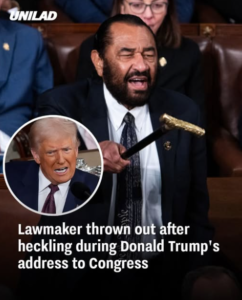During President Donald Trump’s address to a joint session of Congress on March 5, 2025, a dramatic incident unfolded when Democratic Representative Al Green of Texas was ejected from the chamber for heckling the president. The disruption occurred as Trump was discussing his policy agenda, specifically his plans to reduce government spending, including cuts to Medicaid, Medicare, and Social Security.
As Trump began speaking about his electoral mandate and the necessity of these cuts for fiscal responsibility, Representative Green stood up and shouted, “You don’t have a mandate to cut Medicaid!” His outburst immediately drew attention, not only from those in the chamber but also from the national audience watching the event on television. The comment was a direct protest against Trump’s budget proposal, which Green and many other Democrats viewed as harmful to vulnerable populations who rely on social welfare programs like Medicaid.
The situation quickly escalated. Republican lawmakers, who largely supported Trump’s speech and policies, began chanting “U-S-A!” in an attempt to drown out Green’s protest. Speaker of the House Mike Johnson, who was presiding over the session, issued a warning for Green to remain silent and respect the decorum of the chamber. When Green continued to voice his opposition, Speaker Johnson ordered Capitol Police to escort him out of the hall.
Green, unfazed by his removal, later addressed the media outside the chamber. He explained that his protest was not just about opposing Trump’s proposed cuts to Medicaid but about standing up for the millions of Americans who would be directly impacted by such policies. He emphasized that his actions were a reflection of his belief in fighting for the most vulnerable members of society, particularly those who depend on public health programs for survival.
This incident underscores the deep partisan divides in American politics, particularly over issues such as healthcare. Trump’s address was already a highly charged moment, with tensions high as he discussed key elements of his domestic and foreign policy agenda. The outburst from Green added to the tension, highlighting the sharp ideological differences between the president and many of his opponents in Congress.
The disruption also set a precedent for how lawmakers might express their dissent during important speeches. While some may argue that Green’s actions were an undemocratic violation of decorum, others view his protest as a necessary exercise of free speech and a reminder of the stakes involved in the debate over social welfare programs.
In the aftermath of the ejection, many Democrats voiced support for Green’s actions, arguing that it was important to call out what they considered dangerous proposals coming from the White House. Some even criticized Speaker Johnson for having Green removed, calling it an attempt to silence dissent. Meanwhile, Republicans largely defended the removal, stressing the importance of maintaining order and respect during such a formal occasion.
This episode serves as a reminder of the ongoing political struggles in the U.S., particularly regarding healthcare and social programs. With tensions continuing to mount between the two parties, it remains to be seen how such disruptions will affect the broader national dialogue and future legislative efforts.


